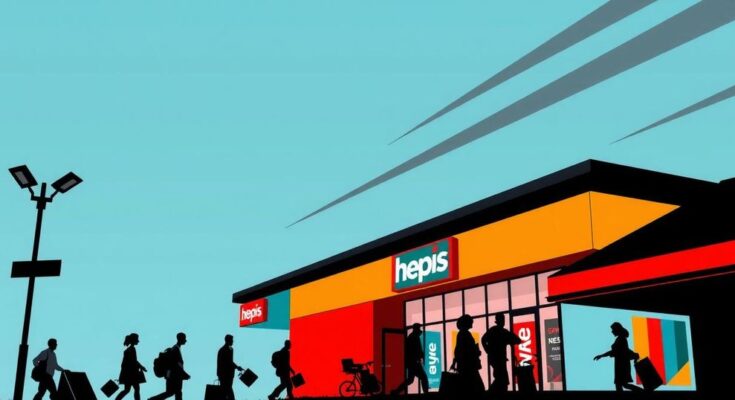Key Zimbabwean retailers are warning of imminent store closures due to unfavorable government exchange rate policies. The mandated official exchange rate of 14.8 ZiG to $1 has inflated prices, while the black market rate reflects a significant devaluation of nearly 80%. This discrepancy poses serious challenges for formal retailers, leading to calls for the government to revisit its pricing strategy to ensure competitiveness and stability.
In Zimbabwe, leading retailers are expressing serious concerns about possible store closures, a consequence of the nation’s official exchange rate policies that have become detrimental to business operations. The government’s stipulation of utilizing an unfavorable official exchange rate of 14.8 Zimbabwe Gold (ZiG) to one US dollar has resulted in significant distortions within the market. This is particularly damaging for prominent retail chains such as OK Zimbabwe, Spar, and TM Supermarkets, which are struggling to maintain competitiveness against informal retailers that benefit from more realistic black market rates, where the ZiG is trading significantly lower, between 20 and 26 ZiG to one dollar. The Retailers Association of Zimbabwe (RAZ) has characterized the ongoing situation as ‘untenable’ without immediate governmental action to adjust pricing regulations in line with actual market dynamics. The persisting economic turmoil in Zimbabwe, marked by a tumultuous currency crisis, threatens the viability of the retail sector, which is under pressure from both rising operational costs and diminished profit margins. The plea from RAZ for a pricing structure reflective of real-time market values aims to foster stability within the industry. Investors and market analysts are advised to remain vigilant regarding governmental responses, as failure to implement necessary reforms may lead to severe market disruptions and potential withdrawal of foreign investment. This current crisis represents Zimbabwe’s sixth effort to stabilize its currency within a span of just 15 years, illustrating the continuing economic fragility that undermines public confidence. Rapid depreciation of the gold-backed ZiG emphasizes the persistent skepticism surrounding the country’s economic policy framework. Unless impactful reforms and initiatives to bolster currency stability are instituted, Zimbabwe is on a trajectory toward deeper economic distress, with implications that extend beyond the retail sector to the broader regional economic landscape.
The economic context in Zimbabwe is characterized by severe instability and currency devaluation which has persisted for many years. The government has been attempting to manage an official exchange rate which often strays from the realities of the black market rates. This discrepancy has created challenges for major retailers, leading to increased operational costs and pressures from informal competitors who operate without the same restrictions. The current situation has raised alarms within the retail sector, prompting calls for urgent governmental intervention to avoid widespread closures of formal retail spaces.
In summary, Zimbabwe is grappling with a critical retail crisis driven by stringent exchange rate policies that have placed immense pressure on major retailers. The disparity between the official and black market rates is undermining profits and competitiveness, compelling the Retailers Association of Zimbabwe to advocate for necessary reforms. Without swift action from the government, the likelihood of significant economic repercussions, including investor withdrawal and increased instability in the retail sector, looms large.
Original Source: finimize.com




